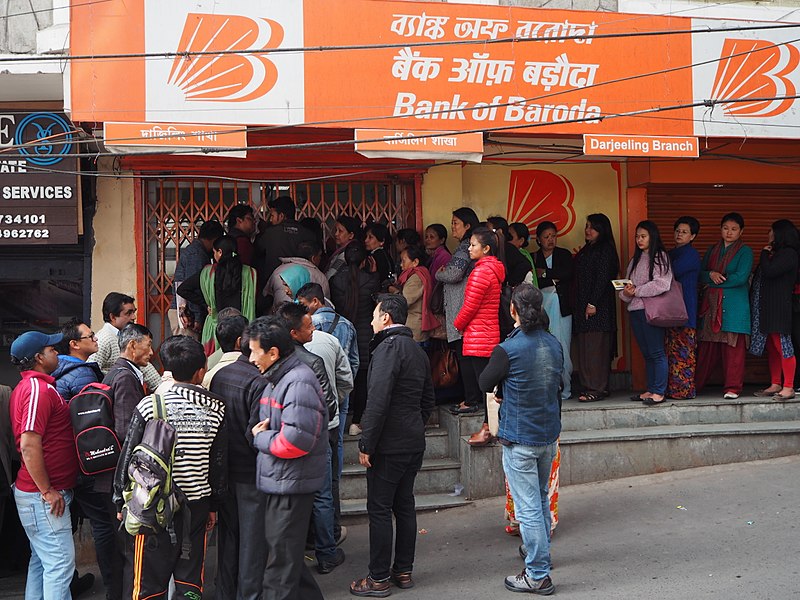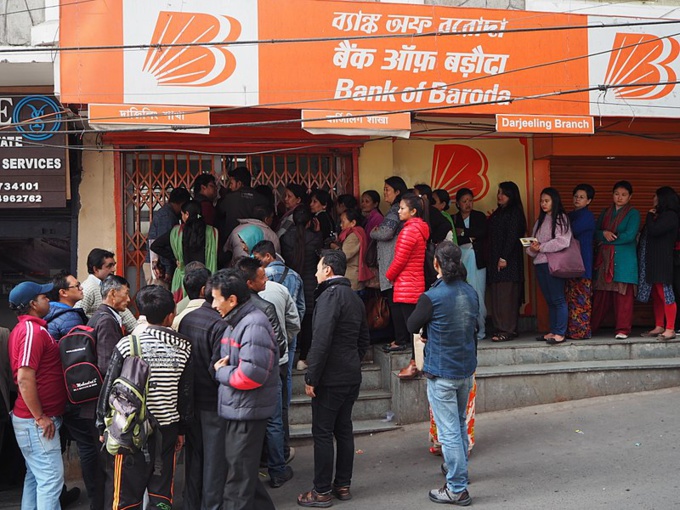The monetary reform in India (withdrawal of 500 and 1,000 rupees in November 2016) was one of the events of a large-scale digitization of the financial sphere, the tax system, public procurement and social benefits, Indian economists note in a work published in the IMF publication "Digital Revolutions in Public Finance." Recall that 86% of cash was withdrawn from circulation during the reform, and about half of them were forcibly placed in bank accounts (before that, the share of cash payments reached 98%). Then, the government reduced the limit on cash transactions and canceled the commission for certain types of electronic payments (including state duties). The previously launched national biometric identification program (Aadhaar), which covered 1.15 billion people, was to increase efficiency of spending budget funds for social payments and tax collection.
However, the key obstacle to reforms was underdevelopment of the infrastructure, the authors of the study emphasize. Despite comparative cheapness of digital services, the level of "digital inequality" in the country is high - for example, the level of penetration of mobile communication is 85.9 per 100 inhabitants, and only 261 million people out of more than a billion people have access to broadband Internet. In WEF’s global "Network readiness index", India took 91st place out of 139, as prevalence of payment terminals at points of sale remains one of the lowest in the world, and the lack of a regulatory framework does not allow to protect personal data of users of digital services, the IMF noted.
Impact of reforms on fiscal policy and digitalization of the economy was enormous, the IMF admitted, noting that they expected their negative impact on economic growth (for example, the IMF forecasted a slowdown in GDP growth in 2016-2017 from 7.6% to 6.6%) and tax base. Fears came true: annual growth was 6.6%, and slowed to 5.7%in the fourth quarter of the tax year (January-March 2017) due to a sharp decline in industrial production and slowing the growth of bank lending. However, the collection of taxes continued to grow at the same pace. However, due to a decline in overall economic activity, the reform had a significant impact on the informal sector of the economy, but did not lead to any significant increase in government revenues.
Forced digital incentives can have many advantages, but the speed of implementation of these initiatives carries significant risks, the IMF stresses. The level of "digital inequality" in the country creates a threat of mistaken exclusion of citizens from the already digitized socialized address system of social benefits (so far, 99 out of 536 measures of social support planned for digitization have been included). Forcing the digitalization of personal and financial data of citizens with a low level of information security can also be dangerous, the IMF notes.
India still has a long way to go before the deep digitalization of the economy. Given the weak level of implementation of government initiatives, the gradual implementation of reforms is preferable, the IMF believes. The priority should be to stimulate investment in infrastructure to reduce the "digital divide", create a regulatory framework for the protection of personal data of consumers, as well as a general increase in digital security and guarantees for citizens.
source: imf.org
However, the key obstacle to reforms was underdevelopment of the infrastructure, the authors of the study emphasize. Despite comparative cheapness of digital services, the level of "digital inequality" in the country is high - for example, the level of penetration of mobile communication is 85.9 per 100 inhabitants, and only 261 million people out of more than a billion people have access to broadband Internet. In WEF’s global "Network readiness index", India took 91st place out of 139, as prevalence of payment terminals at points of sale remains one of the lowest in the world, and the lack of a regulatory framework does not allow to protect personal data of users of digital services, the IMF noted.
Impact of reforms on fiscal policy and digitalization of the economy was enormous, the IMF admitted, noting that they expected their negative impact on economic growth (for example, the IMF forecasted a slowdown in GDP growth in 2016-2017 from 7.6% to 6.6%) and tax base. Fears came true: annual growth was 6.6%, and slowed to 5.7%in the fourth quarter of the tax year (January-March 2017) due to a sharp decline in industrial production and slowing the growth of bank lending. However, the collection of taxes continued to grow at the same pace. However, due to a decline in overall economic activity, the reform had a significant impact on the informal sector of the economy, but did not lead to any significant increase in government revenues.
Forced digital incentives can have many advantages, but the speed of implementation of these initiatives carries significant risks, the IMF stresses. The level of "digital inequality" in the country creates a threat of mistaken exclusion of citizens from the already digitized socialized address system of social benefits (so far, 99 out of 536 measures of social support planned for digitization have been included). Forcing the digitalization of personal and financial data of citizens with a low level of information security can also be dangerous, the IMF notes.
India still has a long way to go before the deep digitalization of the economy. Given the weak level of implementation of government initiatives, the gradual implementation of reforms is preferable, the IMF believes. The priority should be to stimulate investment in infrastructure to reduce the "digital divide", create a regulatory framework for the protection of personal data of consumers, as well as a general increase in digital security and guarantees for citizens.
source: imf.org



















